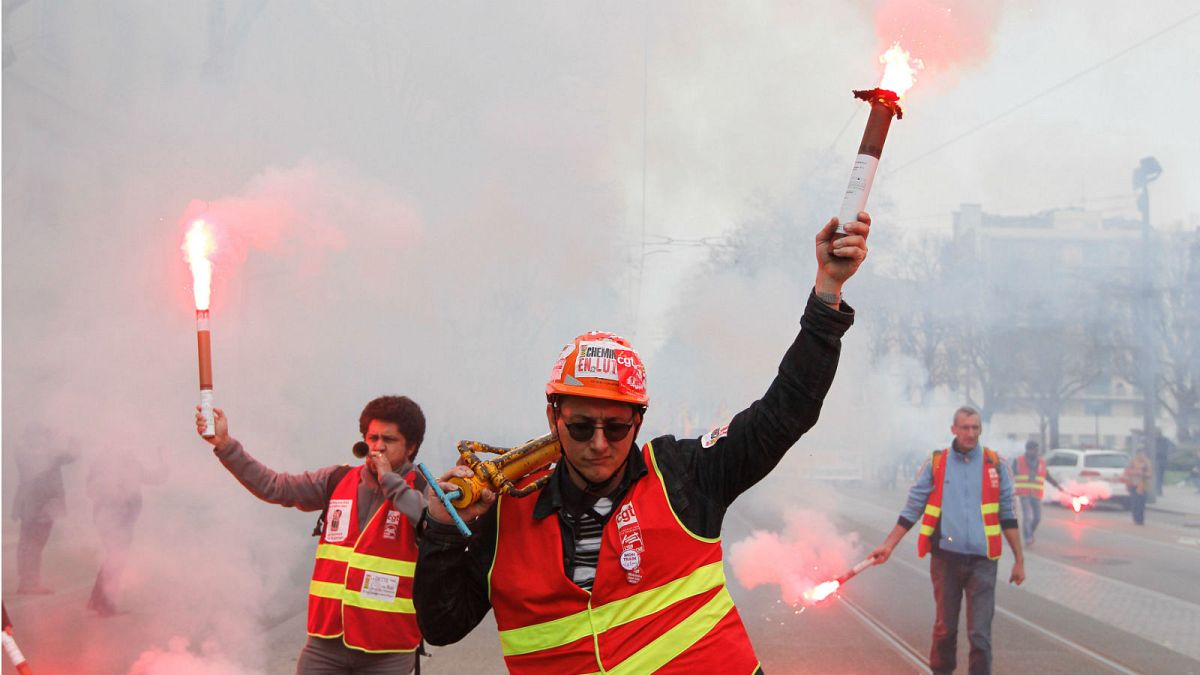As the French hurtle 'full steam ahead' into three months of rail strikes, Euronews looks at when strikes are happening, how they are impacting other transport services, and if the French really support railway workers in downing tools.
After France's rail workers kicked off three weeks of rolling strikes on "Black Tuesday", millions of commuters are set to feel the bite.
Faced with the French government's desire to reform the SNCF, rail company unions opted for an unprecedented and intermittent strike method — 36 days of strikes are planned, which translates to two days of strike action a week for three months.
Here we examine who is affected and how the action is influencing public opinion.
Who is on strike?
Strike participation was down Wednesday compared to the preceding days, the SNCF said in a statement.
Wednesday saw a 29.7% rate of participation mid-morning compared to 33.9% the day before.
The number of train drivers on strike fell slightly to 74%, compared to 77% on Tuesday.
On the other hand, more controllers downed tools with 77% taking part, compared to 69% the day before. The same was the case for signal operators, 46% of whom participated Wednesday compared to 39% on Tuesday.
French people support the strikes
French public opinion seems to be positive towards the mobilization of railway workers, according to a poll published Wednesday.
The survey, conducted on April 3 and 4, found 44% of participants approved of the strike, although 22% said they felt angry about the movement.
Which services are affected?
France has a well-developed rail network that reaches from larger cities out into the country's sprawling countryside — here's which services were affected on April 3.
Which unions called on thier members to strike?
Three unions — CGT, UNSA and CFDT — will carry out "rotating strikes" whereby an individual department or group of departments are brought out on a weekly basis on a rolling programme, causing maximum disruption to the SNCF and minimum financial loss to union members.
Sud-Rail union members will be conducting a general strike and employees involved will hold a meeting each day to see if they want to continue action the following day or not.
Traffic jams in region surrounding Paris
The Ile-de-France region, home to Paris, saw 400 cumulative kilometres of traffic jams during morning rush hour on the first day of strike action.
That's over double the length of queues Parisians suffer on an average day.
Effect on alternative forms of transport
Both bus and car sharing services have felt the strain of the strike action, with French poeople hard pushed to find a place in either over the past few days
On the Blablacar site, a popular car-sharing website in France, 80 of 95 routes out of the northern city of Lille were fully booked.
The company had "twice as many registrations in recent days as a normal week," said Robert Morel, spokesman for Blablacar.
Web searches for 'car share' and 'hitch hike'
French travellers were clearly searching alternatives to train travel on Wednesday, with the search terms "covoiturage" (carpool) and even "autostop citoyen" (hitchhiking) experiencing a spike in traffic.
The transport chaos could last the full three months if no agreement is reached.
Unions say changes to the SNCF will eventually bring about its privatisation — something Prime Minister Édouard Philippe denied, saying the proposals aim to bring change to the heavily-indebted, state-owned SNCF, whose situation was "no longer tenable".
